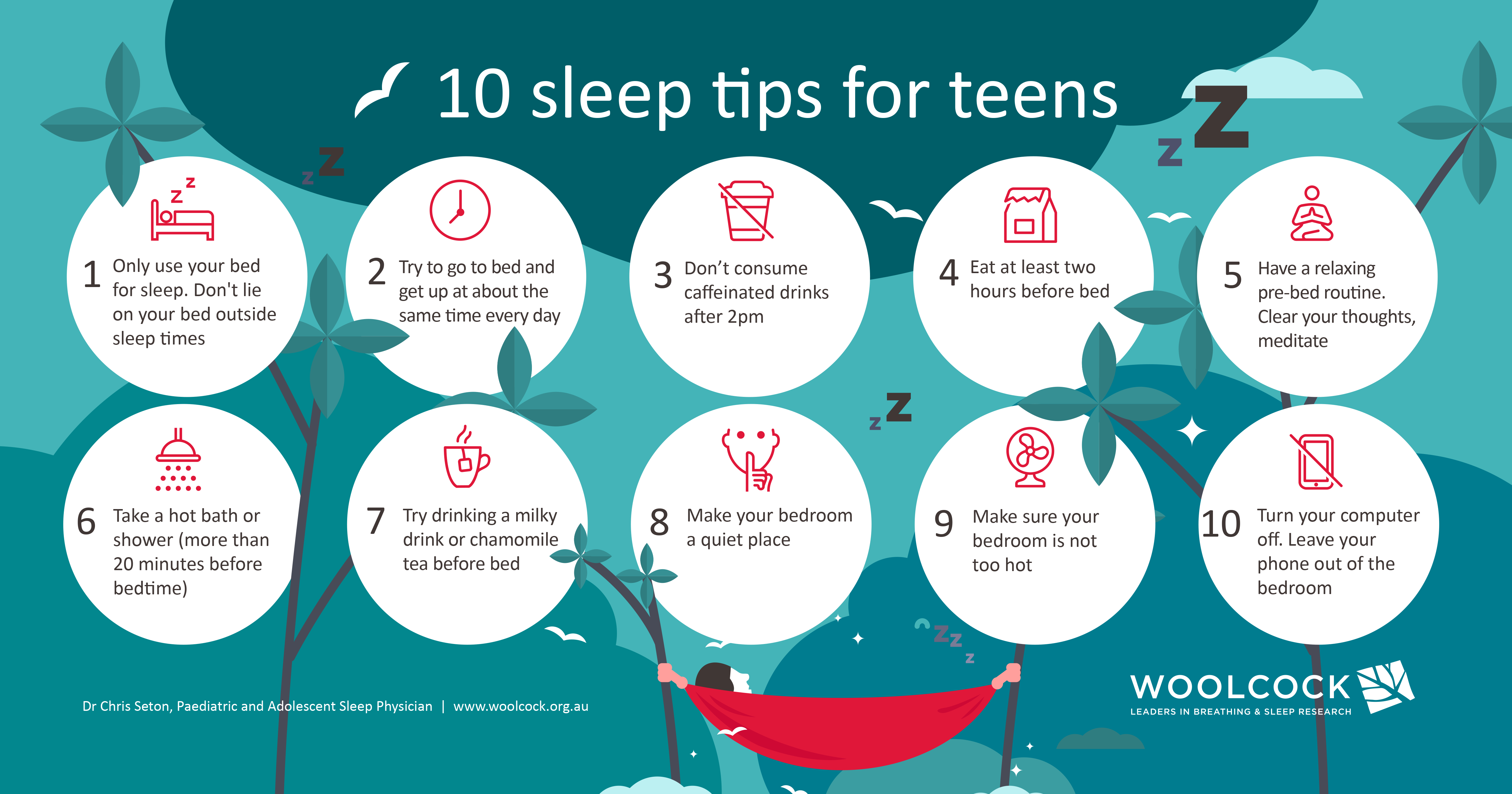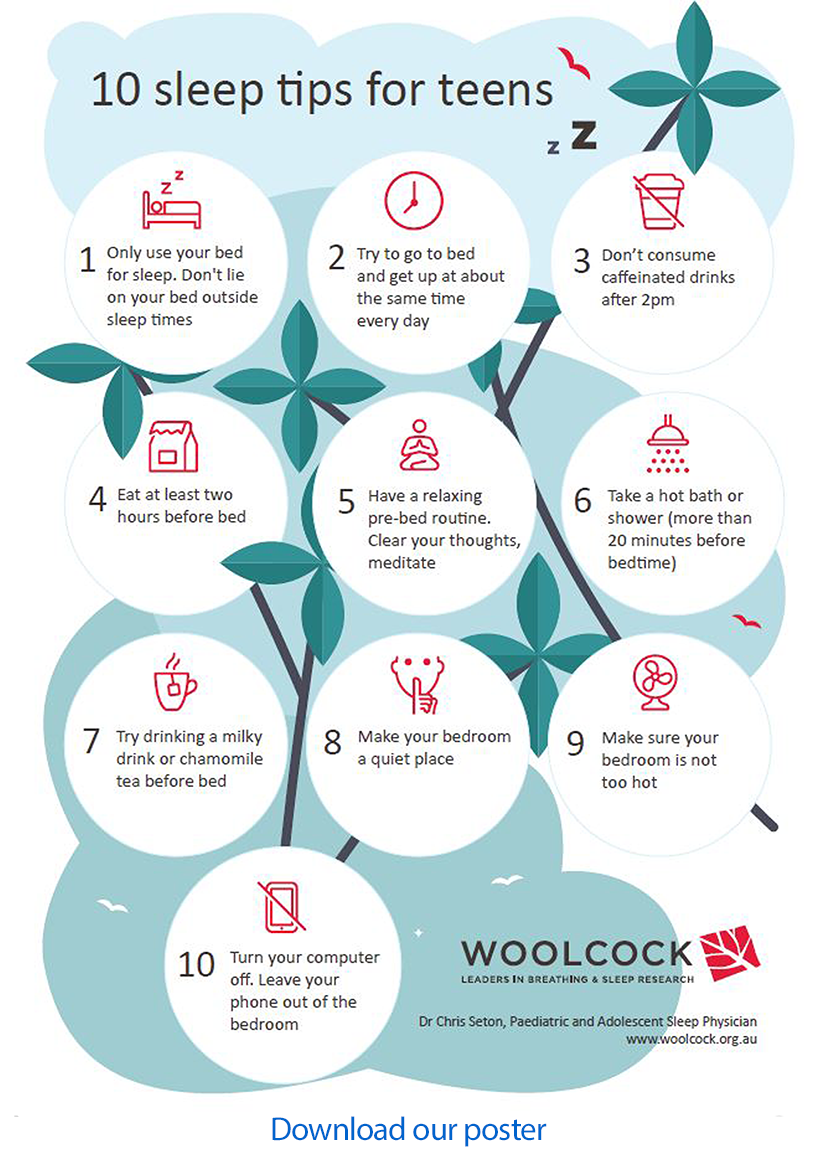The Woolcock Institute of Medical Research

Tips to help young people sleep better
Studies suggest that nearly 3 in 4 teenagers in NSW are chronically sleep-deprived.
Teens need 8 to 9 hours' sleep a night; in NSW, they're getting on average just 7 hours.
Poor sleep in young people is linked with mental health problems, reduced school attendance and more risk-taking behaviours. Sleep-deprived adolescents are also less likely to retain new information.
Dr Chris Seton, a specialist at the Woolcock Paediatric Sleep Clinic, has helped us create 10 tips to get teenagers sleeping better.
Parents: what can you do?
After years of research, we know what works to improve the sleep of young people. The 10 tips here are based on sound evidence and clinical expertise.
However, even though we know what works, getting kids to follow tips such as these is a tougher task.
Improving sleep patterns requires parents and children to work together. Here are some extra tips for parents to help their children on the path to better sleep.
Have a sleep chat
Talk with your teenager. Express your concerns openly and ask them what they think.
Many teens get used to chronic tiredness and therefore lack the insight or motivation to change behaviours that affect their sleep.
Point out to them things that might motivate them to change, such as being better at sport or getting higher marks at school.
Establish a lights out agreement
Negotiate a reasonable school night bedtime, and make sure your teen sticks to it.
Give your support by helping organise the timing of evening activities. Teens, especially boys, are poor evening organisers, and this often delays their bedtime.
Get agreement that bedtime is also lights out time.
Condition bed with relaxation
Bed should be associated with sleep only. Condition teenagers to associate bed with relaxation.
Get your teen to agree to use the bed only for sleep. Don't let them use the bed outside sleep times.
Implement a pre-bedtime routine
Work with your teen to create a relaxing 'winding down' routine that starts 45 minutes before bedtime. No screens. No school work.
Make sure the routine is done away from the bed and bedroom.
Get them to try out different ways to relax as part of their routine. For example, having a warm drink, listening to chill music, taking a bath or shower (though more than 20 minutes before bedtime so they're not too hot), yoga and meditation.
The routine should be done at the same time and in the same order each night. A routine slowly trains the brain that 'sleep is coming soon'.
Don't allow sleep-ins
Minimise big weekend sleep-ins as much as possible. Regular sleep times are important for forming good sleep habits.
Limit screens
All screen devices should be away from the bedroom at night. If a device needs recharging, do it in another room.
This is usually very unpopular. You will get pushback!
If you are unable to separate your teen from their phone, there are apps that can enforce screen time limits.
More digital device strategies
School work should be completed before social screen activity begins. Multi-tasking can delay night-time activities and overstimulate young people.
On school nights, devices should be used in a common area of the house such as the living or dining room.
Have a dedicated weekly no-screen time for the whole family. Do something together that doesn't require screens. This demonstrates that FOMO (fear of missing out) can be overcome, and activities without screens can be fun!
Be a good digital role model: follow these rules yourself.
It's important to act
Left untreated, sleep deprivation just gets worse through adolescence, and may lead to significant mental health problems that persist into adulthood.
Treatment is more successful in young adults, so try out these tips and see a specialist as early as possible.
Print out our 10 sleep tips for teens posterand attach it the wall or fridge. And make an appointment with a specialist in our Paediatric and Adolescent Sleep Service. Our experts can diagnose and treat all sleep issues.
Share these tips online











